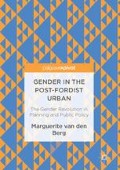Abstract
In this concluding chapter, I argue that the post-Fordist urban is speculative in its focus on future populations. Moreover, I argue that in imagining the yet-to-come, in speculation on the population, (1) women, mothers, mothering, families and children play an important role and (2) gender and femininities are strategic instruments. This chapter also considers the class-gender intersection and the way class is reconfigured in the post-Fordist urban in which Fordist affects nonetheless have an afterlife.
Access this chapter
Tax calculation will be finalised at checkout
Purchases are for personal use only
Notes
- 1.
“Rotterdam heeft haast. De stad vecht zich dood om op iets te lijken wat er nog niet is.” Wilfried de Jong. De Jong (2012) said this in a speech on the occasion of the departure of the national newspaper NRC Handelsblad from Rotterdam. The NRC offices moved to Amsterdam in 2012.
References
Adkins, L. (2002). Revisions: Gender and Sexuality in Late Modernity. Buckingham: Open University Press.
Adkins, L. (2012). Out of Work or Out of Time? Rethinking Labor After the Financial Crisis. South Atlantic Quarterly, 111(4), 621–641.
Berg, van den, M. (2013). City Children and Genderfied Neighbourhoods: The New Generation as Urban Regeneration Strategy. International Journal of Urban and Regional Research, 37(2), 523–536.
Berg, van den, M., & Arts, J. (forthcoming). Evaluating the Aesthetics of Work-Readiness. Aesthetic Judgements for Conditional Welfare and Post-Fordist Labour Markets.
Berg, van den, M., & Chevalier, D. (forthcoming). Of “City Lounges”, “Bans on Gathering” and Macho policies. Gender, Class and Race in Productions of Space for Rotterdam’s Post-Industrial Future.
Berg, van den, M., & Duyvendak, J. W. (2012). Paternalizing Mothers. Feminist Repertoires in Contemporary Dutch Civilizing Offensives. Critical Social Policy, 32(4), 554–574.
Berlant, L. (2007). Nearly Utopian, nearly normal: Post-Fordist affect in La Promesse and Rosetta. Public Culture, 19(2), 273.
Florida, R. L. (2002). The Rise of the Creative Class: And How it’s Transforming Work, Leisure, Community and Everyday Life. New York: Basic Books.
Jong, de, W. (2012, December 10). Net een wereldstad, dat www.bakfiets.nl. NRC Handelsblad, pp. 15.
Kampen, T. (2010). Verplicht vrijwilligerswerk. De moeizame activering van bijstandscliënten. In: I. Verhoeven & M. Ham (Eds.). Brave burgers gezocht. De grenzen van de activerende overheid (pp. 41–56). Amterdam: Van Gennep.
Katz, M. B. (1989). The Undeserving Poor. From the War on Poverty to the War on Welfare. New York: Pantheon Books.
Lorey, I. (2015). State of insecurity: Government of the precarious. New York: Verso Books.
McDowell, L. (1991). Life Without Father and Ford: The New Gender Order of Post-Fordism. Transactions of the Institute of British Geographers, 16(4), 400–419.
McDowell, L. (1997). Capital Culture. Gender at Work in the City. Oxford: Blackwell Publishers Ltd.
McDowell, L. (1999). Gender, Identity and Place: Understanding Feminist Geographies. Minneapolis: University of Minnesota Press.
McDowell, L. (2003). Redundant Masculinities? Employment Change and White Working ClassYouth. Blackwell: Oxford.
McDowell, L. (2009). Working Bodies. Interactive Service Employment and Workplace Identities. Oxford: Wiley-Blackwell.
McRobbie, A. (2007). TOP GIRLS? Young Women and the Post-Feminist Sexual Contract 1. Cultural Studies, 21(4–5), 718–737.
Muehlebach, A. (2011). On Affective Labour in Post-Fordist Italy. Cultural Anthropology, 26(1), 59–82.
Nayak, A. (2006). Displaced Masculinities. Chavs, Youth, and Class in the Post-Industrial City. Sociology, 40(5), 813–831.
Piven, F. F., & Cloward, R. A. (1972). Regulating the Poor. The Functions of Public Welfare. London: Tavistock Publications Limited.
Standing, G. (2008). The Precariat: The Dangerous New Class. London: Bloomsbury Press.
Waal, van der, J. (2009). De invloed van immigratie op de lonen in Amsterdam en Rotterdam. Sociologie, 5(1), 89–111.
Walkerdine, V. (2003). Reclassifying Upward Mobility: Femininity and the Neo-liberal Subject. Gender and Education, 15(3), 237–248.
Watt, P. (2006). Respectability, Roughness and ‘Race’: Neighbourhood Place Images and the Making of Working-Class Social Distinctions in London. International Journal of Urban and Regionalresearch, 30(4), 776–797.
Author information
Authors and Affiliations
Rights and permissions
Copyright information
© 2017 The Author(s)
About this chapter
Cite this chapter
van den Berg, M. (2017). Conclusions: The City as a Potent Muscleman in Pink Stilettos. In: Gender in the Post-Fordist Urban. Palgrave Macmillan, Cham. https://doi.org/10.1007/978-3-319-52533-4_6
Download citation
DOI: https://doi.org/10.1007/978-3-319-52533-4_6
Published:
Publisher Name: Palgrave Macmillan, Cham
Print ISBN: 978-3-319-52532-7
Online ISBN: 978-3-319-52533-4
eBook Packages: Social SciencesSocial Sciences (R0)

